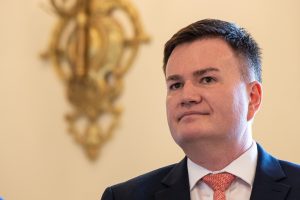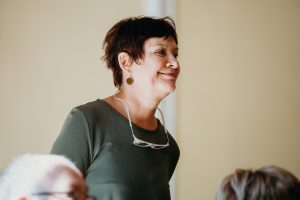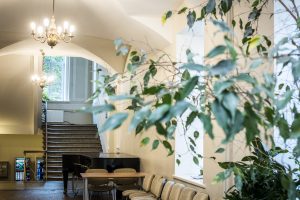It’s the beginning of the new term! 😊
February 1st marks the start of the second term of the academic year of 2020-2021. As the lockdown has been extended, the LMTA community has already received the relevant information regarding the requirements for studies and work in February. Later, hopefully, the restrictions will be eased.
Whatever the case, we’re living in the moment, so let’s get a snapshot of the atmosphere and mood prevailing in our academic community – among our teachers and students – at the beginning of the new term. We’ve spoken to Prof. Deividas Staponkus, Dean of the Faculty of Music, and Elona Bajorinienė, Dean of the Faculty of Theatre and Film.
Prof. Deividas Staponkus, Dean of the Faculty of Music:
 Today is the first day of the spring semester, the first week. We’re adjusting the schedule of individual classes, the students are signing up for the optional courses – little by little, the study process is moving forward. It is great that the information regarding the requirements for work during the lockdown has been disseminated through all possible channels to the LMTA community members. Hopefully, the February 28th will be the last day of the lockdown and in March we will be able to have face-to-face classes with students, well, at least once a week. As far as student self-preparation and individual sessions are concerned, they may further take place in the classrooms. Theoretical lectures are likely to continue in the online format until the end of the semester. Yet, later we might be able to come back to the classrooms or follow the blended learning format.
Today is the first day of the spring semester, the first week. We’re adjusting the schedule of individual classes, the students are signing up for the optional courses – little by little, the study process is moving forward. It is great that the information regarding the requirements for work during the lockdown has been disseminated through all possible channels to the LMTA community members. Hopefully, the February 28th will be the last day of the lockdown and in March we will be able to have face-to-face classes with students, well, at least once a week. As far as student self-preparation and individual sessions are concerned, they may further take place in the classrooms. Theoretical lectures are likely to continue in the online format until the end of the semester. Yet, later we might be able to come back to the classrooms or follow the blended learning format.
At the meetings of the departments, the teachers are engaged in heated discussions on the format of work and studies and consider various alternatives and possibilities: how we are going to live in March, April and May is far from being clear. Some departments, perhaps, will ask to postpone the final exams as the preparation for these requires contact work. Let’s take choirs, ensembles, orchestras, for instance, – they all have to rehearse as a group. At our faculty, we’re doing our best to hold a dialogue with our community, hear everyone’s opinion, and consider their needs.
Obviously, it was during the last spring that we faced the greatest confusion and uncertainty, and by now we’ve gained some experience, so the challenges don’t appear so dramatic. Yet, needless to say, both teachers and students miss the face-to-face setting. The specifics of our studies, after all, require contact work in the first place.
Dean of the Theatre and Film Faculty, Lecturer Elona Bajorinienė:
 We’ve planned the new semester so that at least the theoretical lectures will take place remotely. The practical classes, however, prove to be the biggest headache. Practical classes naturally prevail in the arts specialisations, and the major concern is caused by the fact that as soon as any information regarding the lockdown easing is released, it covers the exceptions made for such disciplines as life sciences or veterinary medicine. Culture and the arts are again overlooked. These disciplines are absent from the sight of the people in power: so, we need to do something to be seen. In our studies, the one-to-one setting is crucial. We know that in the theatres rehearsals do take place, so it is hard to understand why we cannot continue our studies under the same safety conditions keeping to all the requirements. This was exactly how we worked during the spring session when practical sessions were taking place. This question currently causes the major concern.
We’ve planned the new semester so that at least the theoretical lectures will take place remotely. The practical classes, however, prove to be the biggest headache. Practical classes naturally prevail in the arts specialisations, and the major concern is caused by the fact that as soon as any information regarding the lockdown easing is released, it covers the exceptions made for such disciplines as life sciences or veterinary medicine. Culture and the arts are again overlooked. These disciplines are absent from the sight of the people in power: so, we need to do something to be seen. In our studies, the one-to-one setting is crucial. We know that in the theatres rehearsals do take place, so it is hard to understand why we cannot continue our studies under the same safety conditions keeping to all the requirements. This was exactly how we worked during the spring session when practical sessions were taking place. This question currently causes the major concern.
I believe we could start with at least the one-to-one format: a teacher and a student or two students working independently. Our classrooms are large enough to keep the required distance and communicate.
And, you’re asking about the mood… We’re all waiting for the lockdown easing. You can feel the tension. It hasn’t disappeared, especially among those who have to prepare their theses and graduate this year. For these students, live contact is crucial.
On the other hand, during the lockdown period we’ve improved the technological base to create opportunities for online communication. Now, at the Faculty of Theatre and Film, we – with the help of the International Relations Office – are equipping classrooms for both traditional and online communication. The Department of Dance and Movement and the Department of Film and Television are ready to use these new technologies. In general, the technological aspect is substantially improving.
What would the deans like to wish to their students and colleagues?
 Prof. D. Staponkus: I’d like to say: “Stay kind and proactive. Don’t be afraid to ask if something is not clear”. And, of course, I wish you to stay healthy. We all want to come back – as soon as possible – to what we call a normal life. The departments want to organise concerts and contests – we are stage people; we need live contact with the audience.
Prof. D. Staponkus: I’d like to say: “Stay kind and proactive. Don’t be afraid to ask if something is not clear”. And, of course, I wish you to stay healthy. We all want to come back – as soon as possible – to what we call a normal life. The departments want to organise concerts and contests – we are stage people; we need live contact with the audience.
Lecturer Elona Bajorinienė: I wish you to stay proactive. These days, I’ve been working on a report on the student achievements. This period has proven to be rather rich in accomplishments – we have taken about 40 positions, although, naturally, the visual arts dominate: during the pandemic, the Department of Film and Television has found the most opportunities to excel in the online format and take a number of awards. But in other areas too, the creative potential hasn’t disappeared, it is just compressed, like that steam boiler. May this explosion happen faster and bring along lots of interesting creative solutions and experiments!
Beata Baublinskienė
English translation by Viltė Gridasova
2020-02-01
